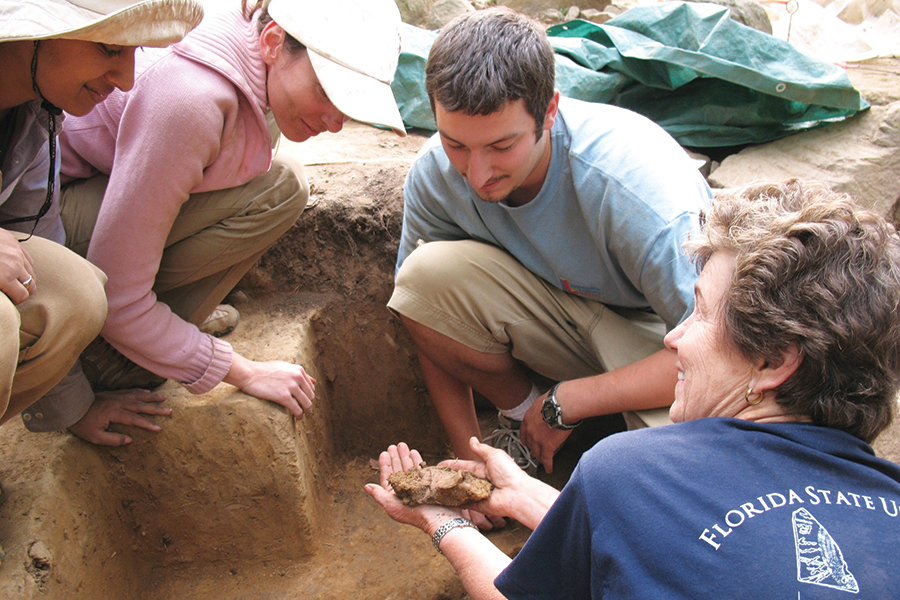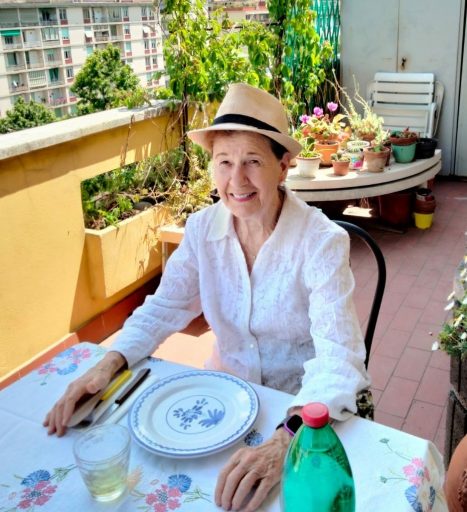
A Florida State University archaeologist and distinguished research professor has earned the highest honor granted by the world's largest and oldest archaeological organization.
Nancy de Grummond, the M. Lynette Thompson Professor of Classics and director of the FSU Archaeological Field School in Italy for the past 42 years, has earned the 2026 Gold Medal Award for Distinguished Archaeological Achievement from the Archaeological Institute of America (AIA). She will be honored at an awards ceremony at the 2026 AIA Annual Meeting in San Francisco, Calif., as well as at a Gold Medal colloquium held in her honor.

"I feel honored and humbled that they chose me," de Grummond said. "Through the years, my main guiding principle has been to follow my instincts and pursue archaeological work that fascinated me. It was equally important to share the process with my students. It's thrilling that I've been honored for something that already gives me great satisfaction."
The AIA supports archaeologists, their research and its dissemination, and the ethical practice of archaeology while promoting archaeological inquiry and public understanding of the material record of the human past to foster an appreciation of cultures and shared humanity. The Gold Medal, awarded to one archaeologist each year, recognizes distinguished contributions to the discipline through research and fieldwork.
"The AIA's Gold Medal is something of a lifetime achievement award, and Nancy has had a lifetime of remarkable achievements," said Tim Stover, chair of the Department of Classics. "Her career includes influential research, pathbreaking fieldwork and impressive museum work - she's exactly the type of scholar for whom this prestigious award was created."
After founding the Archaeological Field School at the Cetamura del Chianti site in 1978, de Grummond became field director of the Cetamura program in 1983 and has since provided more than 500 graduate and undergraduate students with opportunities to participate in excavation, preservation work and the construction of exhibitions at Cetamura. The program is also supported by FSU International Programs and the FSU Study Center in Florence.
Excavations at Cetamura - which since the 7th century B.C.E. was home to Etruscans and later Romans, as well as Italians of the Middle Ages - have garnered international attention over the decades, in particular for the discoveries of an Etruscan sanctuary in 2006, water-logged grape seeds containing centuries-old DNA from an Etruscan well in 2013, and a collection of ancient Roman coins in 2016.
"This program has been very successful in training students to become professors, field archaeologists and other professionals," de Grummond said. "I enjoy being in the field with the students, and I love being a university professor. I come to life when I'm around my students. More students are returning to Cetamura year after year, and they're such an important part of my journey."
This is de Grummond's third award from the institute. In 2015, she received AIA's Excellence in Undergraduate Teaching Award for her work in the classroom, and in 2022 she was presented with AIA's Martha and Artemis Joukowsky Distinguished Service Award for her career-spanning service to the institute on local, regional and national levels. She is the first archaeologist to receive these three accolades, according to AIA officials. After serving as the president of the Tallahassee Society of the AIA, she helped the University of Florida open its own AIA chapter. De Grummond was also elected to and served on the program committee, the Gold Medal Award committee, the executive committee, and other groups within the institute.
In addition to her fieldwork, de Grummond has authored four books and 12 edited volumes on Etruscan art, religion, history, and excavations at Cetamura del Chianti. She organized 16 public exhibitions and played a major role in establishing the Museum of the Origins of Chianti, which opened in 2023 a few kilometers from the Cetamura site and features archaeological displays and finds from Cetamura, a painting gallery, histories of Chianti's vineyards and landscapes and more.
At FSU, de Grummond has earned numerous honors, grants and awards from the university. She is an elected fellow of the Society of Antiquaries of London as well as the Instituto Nazionale di Studi Etruschi ed Italici, or INSEI, in Italy. She serves as president for the North American section of INSEI, and her research on the Etruscans led her to write and co-edit "Etruscan Cities and Communities," a series of historical volumes published by the University of Texas Press.
"As an influential, inspirational and generous scholar, Nancy's work has not only changed the way we think about the Etruscans but has also positively impacted the lives of countless students," Stover said.
To learn more about research in the Department of Classics, visit classics.fsu.edu. Learn more about the Cetamura del Chianti archaeological site online.






